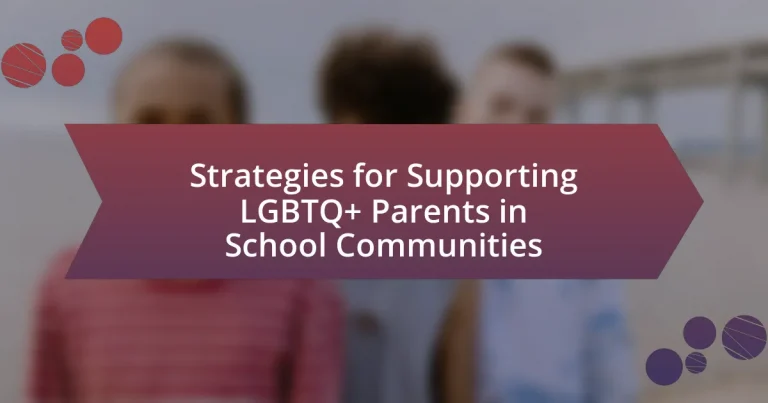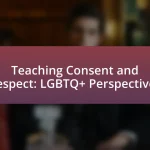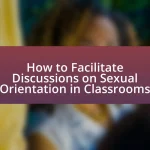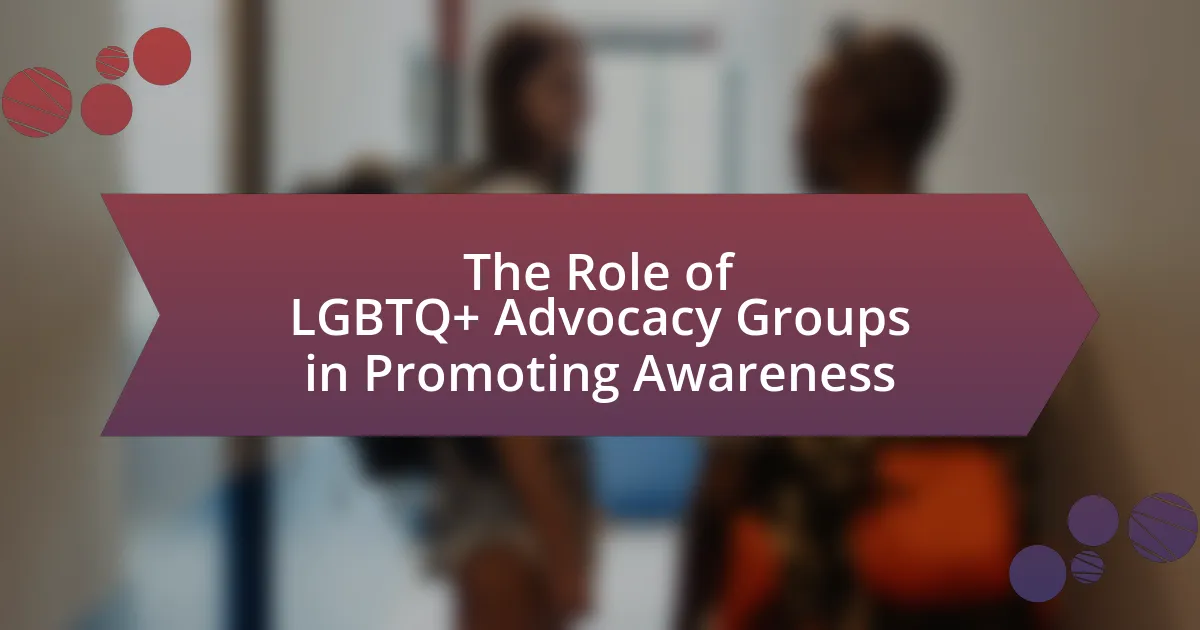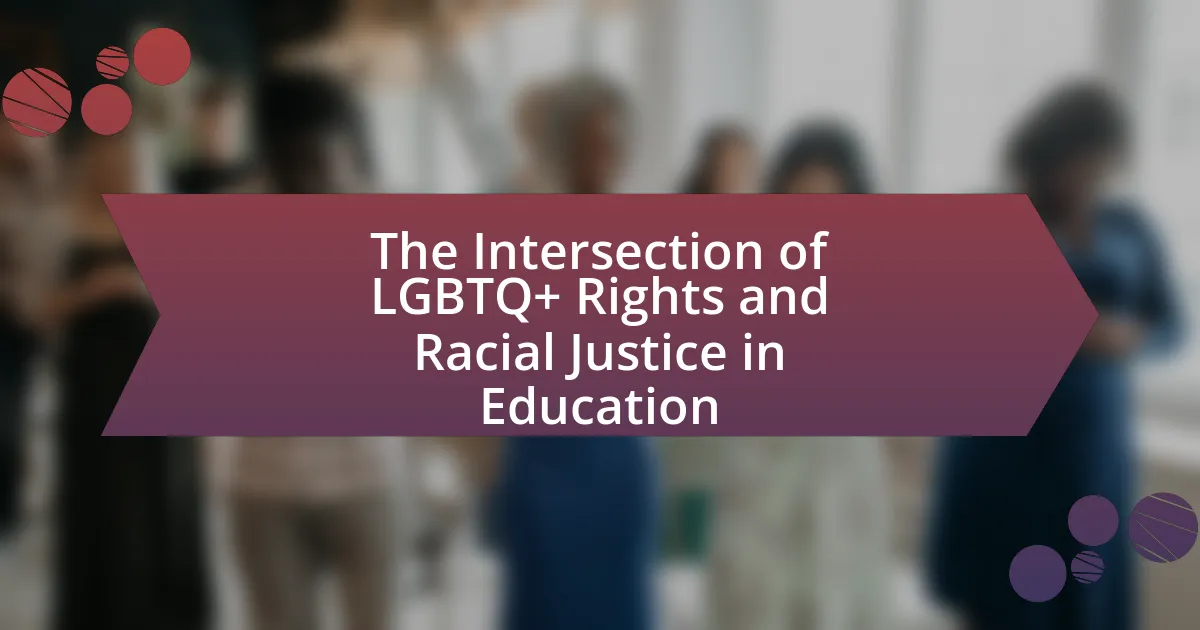The article focuses on strategies for supporting LGBTQ+ parents within school communities, emphasizing the importance of fostering an inclusive environment, providing staff training, and encouraging open communication. Key strategies include implementing anti-discrimination policies, creating inclusive curricula, and establishing support networks for LGBTQ+ families. The article highlights the role of school administrators in promoting equity and the necessity of involving LGBTQ+ parents in decision-making processes to enhance student outcomes. Additionally, it addresses the challenges faced by LGBTQ+ parents, such as discrimination and lack of representation, and outlines best practices for schools to improve accessibility to resources and support systems for these families.

What are the key strategies for supporting LGBTQ+ parents in school communities?
Key strategies for supporting LGBTQ+ parents in school communities include fostering an inclusive environment, providing resources and training for staff, and encouraging open communication. Creating an inclusive environment involves implementing policies that recognize and respect diverse family structures, which can enhance the sense of belonging for LGBTQ+ parents. Providing resources and training for staff ensures that educators are equipped to address the unique challenges faced by LGBTQ+ families, promoting understanding and sensitivity. Encouraging open communication between parents and school staff allows for the sharing of concerns and experiences, which can lead to more tailored support and engagement. These strategies are supported by research indicating that inclusive practices in schools lead to improved outcomes for LGBTQ+ families and their children.
How can schools create an inclusive environment for LGBTQ+ parents?
Schools can create an inclusive environment for LGBTQ+ parents by implementing policies that promote diversity and respect for all family structures. This includes training staff on LGBTQ+ issues, ensuring representation in school materials, and fostering open communication channels for LGBTQ+ parents to engage with the school community. Research indicates that inclusive policies lead to improved student outcomes and a more supportive school climate, as evidenced by a study from the Human Rights Campaign, which found that schools with LGBTQ+ inclusive policies report higher levels of parental involvement and student well-being.
What policies can be implemented to support LGBTQ+ inclusion?
Policies that can be implemented to support LGBTQ+ inclusion include anti-discrimination laws, inclusive curricula, and training programs for staff. Anti-discrimination laws protect LGBTQ+ individuals from bias in employment, housing, and education, ensuring equal rights and opportunities. Inclusive curricula that reflect diverse family structures and histories promote understanding and acceptance among students. Training programs for educators equip them with the knowledge and skills to create a supportive environment for LGBTQ+ students and families, fostering a culture of respect and inclusion. These policies are supported by research indicating that inclusive practices lead to improved mental health outcomes and academic performance for LGBTQ+ youth.
How can staff training enhance support for LGBTQ+ parents?
Staff training can enhance support for LGBTQ+ parents by equipping educators with the knowledge and skills to create an inclusive environment. Training programs that focus on LGBTQ+ issues help staff understand the unique challenges faced by these parents, such as discrimination and lack of representation. For instance, research from the Human Rights Campaign indicates that inclusive training leads to improved communication and trust between school staff and LGBTQ+ families, fostering a supportive community. Additionally, training can provide practical strategies for addressing bias and promoting acceptance, which ultimately benefits the entire school environment.
What role do school administrators play in supporting LGBTQ+ parents?
School administrators play a crucial role in supporting LGBTQ+ parents by fostering an inclusive environment and implementing policies that promote equity. They can establish anti-discrimination policies, provide training for staff on LGBTQ+ issues, and create support networks for LGBTQ+ families. Research indicates that schools with inclusive practices see improved student outcomes and increased parental engagement, highlighting the importance of administrative support in creating a welcoming atmosphere for LGBTQ+ parents.
How can administrators foster open communication with LGBTQ+ families?
Administrators can foster open communication with LGBTQ+ families by creating inclusive policies and practices that prioritize engagement and support. This can be achieved through regular outreach initiatives, such as hosting informational meetings and workshops specifically designed for LGBTQ+ families, which encourage dialogue and provide a platform for sharing experiences and concerns. Research indicates that schools with active LGBTQ+ support programs report higher levels of satisfaction among LGBTQ+ families, demonstrating the effectiveness of such initiatives in building trust and communication. Additionally, training staff on LGBTQ+ issues and cultural competency can further enhance understanding and responsiveness, ensuring that families feel welcomed and valued within the school community.
What initiatives can be introduced to engage LGBTQ+ parents in school activities?
To engage LGBTQ+ parents in school activities, schools can implement initiatives such as inclusive family events, support groups, and educational workshops. Inclusive family events, like pride celebrations or family potlucks, create a welcoming environment that encourages participation from LGBTQ+ families. Support groups provide a platform for LGBTQ+ parents to connect and share experiences, fostering community and support. Educational workshops on LGBTQ+ issues can raise awareness among staff and parents, promoting understanding and acceptance. Research indicates that inclusive practices in schools lead to improved engagement and satisfaction among LGBTQ+ families, enhancing their overall school experience.
Why is it important to involve LGBTQ+ parents in school decision-making?
Involving LGBTQ+ parents in school decision-making is crucial for fostering an inclusive and equitable educational environment. Their participation ensures that diverse perspectives are represented, which can lead to policies and practices that better address the needs of all students, including those from LGBTQ+ families. Research indicates that schools with active engagement from LGBTQ+ parents report higher levels of student well-being and academic success, as these parents can advocate for inclusive curricula and anti-bullying measures. Furthermore, studies show that inclusive decision-making processes contribute to a sense of belonging among students, which is essential for their emotional and social development.
What benefits arise from including LGBTQ+ parents in school governance?
Including LGBTQ+ parents in school governance enhances diversity, representation, and inclusivity within the educational environment. Their participation fosters a broader understanding of the unique challenges faced by LGBTQ+ families, leading to more informed policies and practices that support all students. Research indicates that schools with diverse governance structures are better equipped to address issues of equity and social justice, ultimately creating a more welcoming atmosphere for all families. For instance, a study by the National School Boards Association highlights that inclusive governance can improve student outcomes by promoting a sense of belonging and reducing discrimination.
How can schools ensure that LGBTQ+ parents’ voices are heard?
Schools can ensure that LGBTQ+ parents’ voices are heard by actively creating inclusive communication channels and fostering a welcoming environment. Implementing regular surveys and feedback sessions specifically targeting LGBTQ+ parents allows schools to gather their perspectives and concerns. Additionally, establishing LGBTQ+ parent advisory committees can provide a structured platform for these parents to share their experiences and suggestions directly with school administration. Research indicates that schools with inclusive policies and practices see higher levels of engagement from diverse parent groups, which reinforces the importance of these strategies in promoting representation and support within the school community.

What challenges do LGBTQ+ parents face in school communities?
LGBTQ+ parents face significant challenges in school communities, including discrimination, lack of representation, and inadequate support systems. Discrimination can manifest through negative attitudes from staff, parents, or students, leading to feelings of isolation and exclusion. Additionally, the lack of representation in school curricula and activities can make LGBTQ+ families feel invisible, impacting their engagement with the school community. Research indicates that 42% of LGBTQ+ parents report experiencing discrimination in educational settings, highlighting the need for inclusive policies and practices to support these families effectively.
How can schools address discrimination against LGBTQ+ parents?
Schools can address discrimination against LGBTQ+ parents by implementing inclusive policies and fostering a supportive environment. Establishing clear anti-discrimination policies that explicitly protect LGBTQ+ parents ensures that their rights are recognized and upheld. Training staff on LGBTQ+ issues promotes understanding and reduces bias, while creating support groups for LGBTQ+ parents encourages community building and provides a platform for their voices. Research indicates that inclusive school environments lead to better outcomes for all families, as demonstrated by studies showing that schools with comprehensive diversity training report lower instances of discrimination.
What are common forms of discrimination faced by LGBTQ+ parents in schools?
LGBTQ+ parents commonly face discrimination in schools through bullying, exclusion from school activities, and biased treatment from staff. Bullying can manifest as verbal harassment from other parents or students, creating a hostile environment. Exclusion from school activities often occurs when LGBTQ+ parents are not invited to participate in events or decision-making processes, undermining their involvement in their children’s education. Biased treatment from staff may include negative assumptions about parenting abilities or lack of support for LGBTQ+ issues, which can further marginalize these families. Research indicates that such discrimination can negatively impact both the parents and their children, leading to feelings of isolation and decreased engagement in the school community.
How can schools create a zero-tolerance policy for discrimination?
Schools can create a zero-tolerance policy for discrimination by establishing clear definitions of discriminatory behavior, implementing comprehensive training programs for staff, and enforcing strict consequences for violations. Clear definitions ensure that all members of the school community understand what constitutes discrimination, including specific references to race, gender, sexual orientation, and other protected characteristics. Comprehensive training equips staff with the knowledge and skills to recognize and address discriminatory behavior effectively. Enforcing strict consequences, such as disciplinary actions for offenders, reinforces the seriousness of the policy and deters future incidents. Research indicates that schools with well-defined policies and consistent enforcement experience a reduction in discriminatory incidents, fostering a safer and more inclusive environment for all students.
What barriers exist for LGBTQ+ parents in accessing school resources?
LGBTQ+ parents face several barriers in accessing school resources, including discrimination, lack of inclusive policies, and inadequate training for school staff. Discrimination can manifest in negative attitudes or behaviors from educators and other parents, which may discourage LGBTQ+ parents from engaging with the school community. Additionally, many schools lack inclusive policies that recognize diverse family structures, leading to feelings of exclusion among LGBTQ+ families. Furthermore, insufficient training for school staff on LGBTQ+ issues can result in misunderstandings and a lack of support for these parents, ultimately hindering their ability to access necessary resources for their children.
How can schools improve accessibility to resources for LGBTQ+ families?
Schools can improve accessibility to resources for LGBTQ+ families by implementing inclusive policies and providing targeted support services. Inclusive policies, such as anti-discrimination measures and the establishment of LGBTQ+ support groups, create a welcoming environment that encourages engagement from LGBTQ+ families. Additionally, schools can offer workshops and informational sessions that address the specific needs and concerns of LGBTQ+ parents, ensuring they have access to relevant resources. Research indicates that schools with supportive environments see increased participation from LGBTQ+ families, which enhances community cohesion and student well-being.
What support systems can be established to assist LGBTQ+ parents?
Support systems that can be established to assist LGBTQ+ parents include inclusive parenting workshops, peer support groups, and access to legal resources. Inclusive parenting workshops can provide education on LGBTQ+ family dynamics and parenting strategies, fostering a sense of community and understanding. Peer support groups allow LGBTQ+ parents to share experiences and challenges, creating a network of emotional support. Access to legal resources is crucial for navigating issues related to custody, adoption, and discrimination, ensuring that LGBTQ+ parents are informed of their rights and protections. These systems are essential for promoting the well-being of LGBTQ+ families and enhancing their involvement in school communities.
Why is it crucial to understand the unique experiences of LGBTQ+ parents?
Understanding the unique experiences of LGBTQ+ parents is crucial because it informs effective support strategies within school communities. LGBTQ+ parents often face distinct challenges, such as discrimination and lack of representation, which can impact their children’s educational experiences. Research indicates that inclusive environments positively affect student outcomes; for instance, a study by the Williams Institute found that children of LGBTQ+ parents are more likely to thrive in supportive settings that acknowledge their family structures. Recognizing these unique experiences allows educators and policymakers to create tailored resources and foster an inclusive atmosphere that benefits all families.
How do the experiences of LGBTQ+ parents differ from those of heterosexual parents?
LGBTQ+ parents often face unique challenges that differ significantly from those encountered by heterosexual parents. These challenges include societal stigma, discrimination, and legal hurdles related to parental rights, which can affect their experiences in parenting and interactions with institutions like schools. For instance, a study published in the Journal of Family Issues found that LGBTQ+ parents reported higher levels of stress and anxiety due to concerns about acceptance and support from schools compared to their heterosexual counterparts. Additionally, LGBTQ+ parents may have to navigate complex family structures, such as co-parenting arrangements or adoption processes, which can further complicate their experiences.
What impact do these experiences have on their children’s education?
Experiences of LGBTQ+ parents significantly impact their children’s education by fostering an inclusive environment that enhances academic performance and social development. Research indicates that children of LGBTQ+ parents often exhibit higher levels of resilience and adaptability, which contribute positively to their educational experiences. A study published in the Journal of Family Psychology found that children raised by same-sex parents perform equally well academically compared to their peers, demonstrating that supportive family structures can lead to positive educational outcomes. Additionally, inclusive school policies that recognize and support LGBTQ+ families can reduce bullying and discrimination, further promoting a conducive learning atmosphere for all students.

How can community partnerships enhance support for LGBTQ+ parents in schools?
Community partnerships can enhance support for LGBTQ+ parents in schools by fostering inclusive environments and providing resources tailored to their needs. These partnerships can involve local LGBTQ+ organizations, which offer workshops, counseling, and advocacy, thereby equipping schools with the knowledge and tools to address the unique challenges faced by LGBTQ+ families. For instance, research from the Human Rights Campaign indicates that schools with active partnerships with LGBTQ+ organizations report higher levels of acceptance and support for LGBTQ+ students and their families. This collaboration not only promotes awareness but also creates a network of support that empowers LGBTQ+ parents to engage more fully in their children’s education.
What organizations can schools collaborate with to support LGBTQ+ parents?
Schools can collaborate with organizations such as PFLAG, GLSEN, and the Human Rights Campaign to support LGBTQ+ parents. PFLAG provides resources and support for LGBTQ+ individuals and their families, fostering understanding and acceptance within school communities. GLSEN focuses on creating safe and affirming schools for LGBTQ+ students and families through advocacy and educational programs. The Human Rights Campaign offers tools and resources to help schools implement inclusive policies and practices, ensuring that LGBTQ+ parents feel welcomed and supported. These organizations have established credibility and effectiveness in promoting LGBTQ+ rights and inclusion in educational settings.
How can local LGBTQ+ organizations provide resources for schools?
Local LGBTQ+ organizations can provide resources for schools by offering educational materials, training programs, and support networks that promote inclusivity and understanding of LGBTQ+ issues. These organizations often develop curricula that address LGBTQ+ history and rights, which can be integrated into school programs to foster a more inclusive environment. Additionally, they can conduct workshops for educators and staff to equip them with the knowledge and skills necessary to support LGBTQ+ students and families effectively. Research shows that schools with comprehensive LGBTQ+ resources report higher levels of student safety and well-being, highlighting the importance of these initiatives in creating supportive school communities.
What role do community events play in fostering inclusivity?
Community events play a crucial role in fostering inclusivity by providing a platform for diverse individuals to connect, share experiences, and build relationships. These events encourage participation from various groups, including LGBTQ+ parents, thereby promoting understanding and acceptance within the community. Research indicates that inclusive community events can lead to increased social cohesion and a sense of belonging, which are essential for marginalized groups. For instance, a study published in the Journal of Community Psychology found that community engagement activities significantly enhance feelings of inclusion among participants, particularly in diverse settings.
How can schools engage parents and families in LGBTQ+ advocacy?
Schools can engage parents and families in LGBTQ+ advocacy by creating inclusive environments that encourage open dialogue and participation. This can be achieved through organizing workshops and informational sessions that educate families about LGBTQ+ issues, fostering understanding and support. Research indicates that schools that implement family engagement programs see increased participation from parents, which enhances community support for LGBTQ+ initiatives. For example, the Human Rights Campaign emphasizes the importance of involving families in discussions about diversity and inclusion, which can lead to a more supportive school climate for LGBTQ+ students.
What strategies can be used to promote LGBTQ+ advocacy among parents?
To promote LGBTQ+ advocacy among parents, schools can implement educational workshops that focus on LGBTQ+ issues, fostering understanding and acceptance. These workshops can provide parents with accurate information about sexual orientation and gender identity, helping to dispel myths and reduce stigma. Research indicates that parental education significantly impacts children’s acceptance of diversity; for instance, a study published in the Journal of Family Psychology found that parents who attended such workshops were more likely to support LGBTQ+ rights and create inclusive environments at home. Additionally, schools can facilitate support groups for parents, allowing them to share experiences and strategies, which can strengthen community ties and advocacy efforts.
How can schools facilitate workshops or seminars for LGBTQ+ parents?
Schools can facilitate workshops or seminars for LGBTQ+ parents by creating inclusive environments that prioritize their needs and concerns. This can be achieved through collaboration with LGBTQ+ organizations to develop relevant content, ensuring that facilitators are knowledgeable about LGBTQ+ issues, and providing a safe space for open dialogue. Research indicates that inclusive school policies and practices lead to increased parental engagement, which enhances student outcomes. For instance, a study by GLSEN found that schools with supportive policies for LGBTQ+ individuals see higher levels of parental involvement, which is crucial for fostering a strong school community.
What best practices can schools adopt to support LGBTQ+ parents effectively?
Schools can adopt inclusive policies and practices to effectively support LGBTQ+ parents. Implementing anti-discrimination policies that explicitly protect LGBTQ+ individuals fosters a safe environment. Providing training for staff on LGBTQ+ issues enhances understanding and sensitivity, which is crucial for creating an inclusive atmosphere. Establishing support groups or networks for LGBTQ+ parents encourages community building and provides a platform for sharing experiences. Additionally, incorporating LGBTQ+ topics into the curriculum promotes awareness and acceptance among all students and families. Research indicates that schools with inclusive practices see improved engagement from LGBTQ+ families, leading to better educational outcomes for their children.
How can schools implement feedback mechanisms for LGBTQ+ parents?
Schools can implement feedback mechanisms for LGBTQ+ parents by establishing regular communication channels, such as surveys, focus groups, and dedicated forums. These methods allow LGBTQ+ parents to express their concerns and suggestions regarding school policies and practices. Research indicates that inclusive feedback systems enhance parental engagement and improve school climate, as evidenced by a study published in the Journal of Educational Psychology, which found that schools with active parent feedback mechanisms reported higher satisfaction among diverse parent groups. By prioritizing these feedback mechanisms, schools can create a more inclusive environment that addresses the specific needs of LGBTQ+ families.
What ongoing training should staff receive to support LGBTQ+ families?
Staff should receive ongoing training in cultural competency, inclusive practices, and legal rights related to LGBTQ+ families. This training should cover topics such as understanding diverse family structures, addressing biases, and implementing inclusive policies. Research indicates that schools with comprehensive training programs see improved relationships with LGBTQ+ families and a more supportive environment for all students. For instance, a study by GLSEN found that schools with LGBTQ+ inclusive curricula and staff training reported higher levels of safety and acceptance among students.
